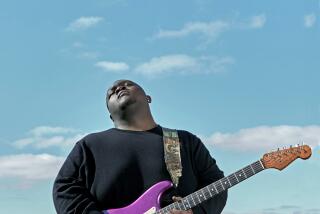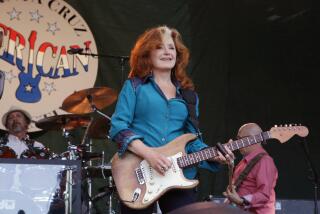POP MUSIC REVIEW : Emotion, Artistry From King
- Share via
ANAHEIM — When it comes to American treasures, ranB. King right up there with the Grand Canyon and baseball. The bluesman is one of the most masterful singers and instrumentalists this nation has produced and he has a true passion for sharing those gifts.
Where rockers aged less than half of his 66 years often lose their spark, King has kept up a grueling tour schedule through four decades, with many miles of that road pitted by racism and rip-offs.
Yet the emotion and artistry he brought to his performance Friday night at the Celebrity Theatre--where he shared the bill with R&B; vets Ruth Brown and Bobby Bland--seemed more vital than ever.
The show’s sole concession to King’s age was that he did nearly half the performance seated, something new for him. The regally portly guitarist, as usual, overwhelmed with his thunderously shouted vocals and searing solos, which have made him the prime reference point for blues and rock guitarists.
The subtle horn-like phrasing, dramatic structuring and incredible voice-tone finger vibrato of King’s playing are unapproachable marvels for fretboard fanatics. And you didn’t need to know diddley about the guitar to feel the way King’s playing sends sparks flying through your soul.
Friday, he still conjured up the raw, distorted blare of his ‘50s hits “You Upset Me Baby” and “Sweet Sixteen,” while his playing was all sobs and caresses on “The Thrill Is Gone.” King ended his set with a wild up-tempo version of U2’s “When Love Comes to Town,” kicking the rhythm with a gospel fervor that epitomized the liberation the Irish rock group only talks about.
Brown did a splendid job of conjuring up the early ‘50s when R&B;, she said, stood for Ruth Brown. Along with singing her seminal hits “5-10-15 Hours” and “Oh What a Dream,” she gave an evocative reminiscence of the days when she performed not in concert halls but in warehouses on the backs of tobacco trucks. Bland opened the evening with a set that was best when he took a low-keyed approach that didn’t tax a voice that now seems unable to reach its former shouting glory.
More to Read
The biggest entertainment stories
Get our big stories about Hollywood, film, television, music, arts, culture and more right in your inbox as soon as they publish.
You may occasionally receive promotional content from the Los Angeles Times.










